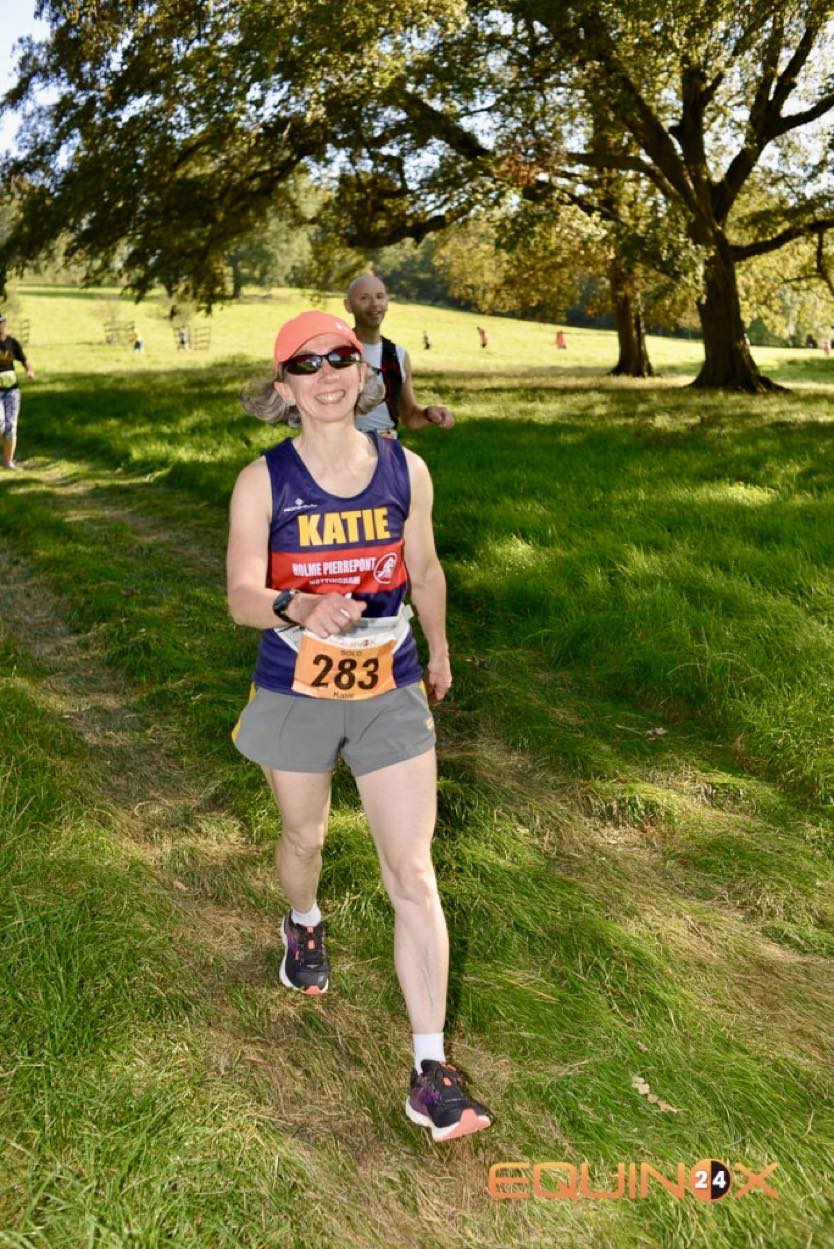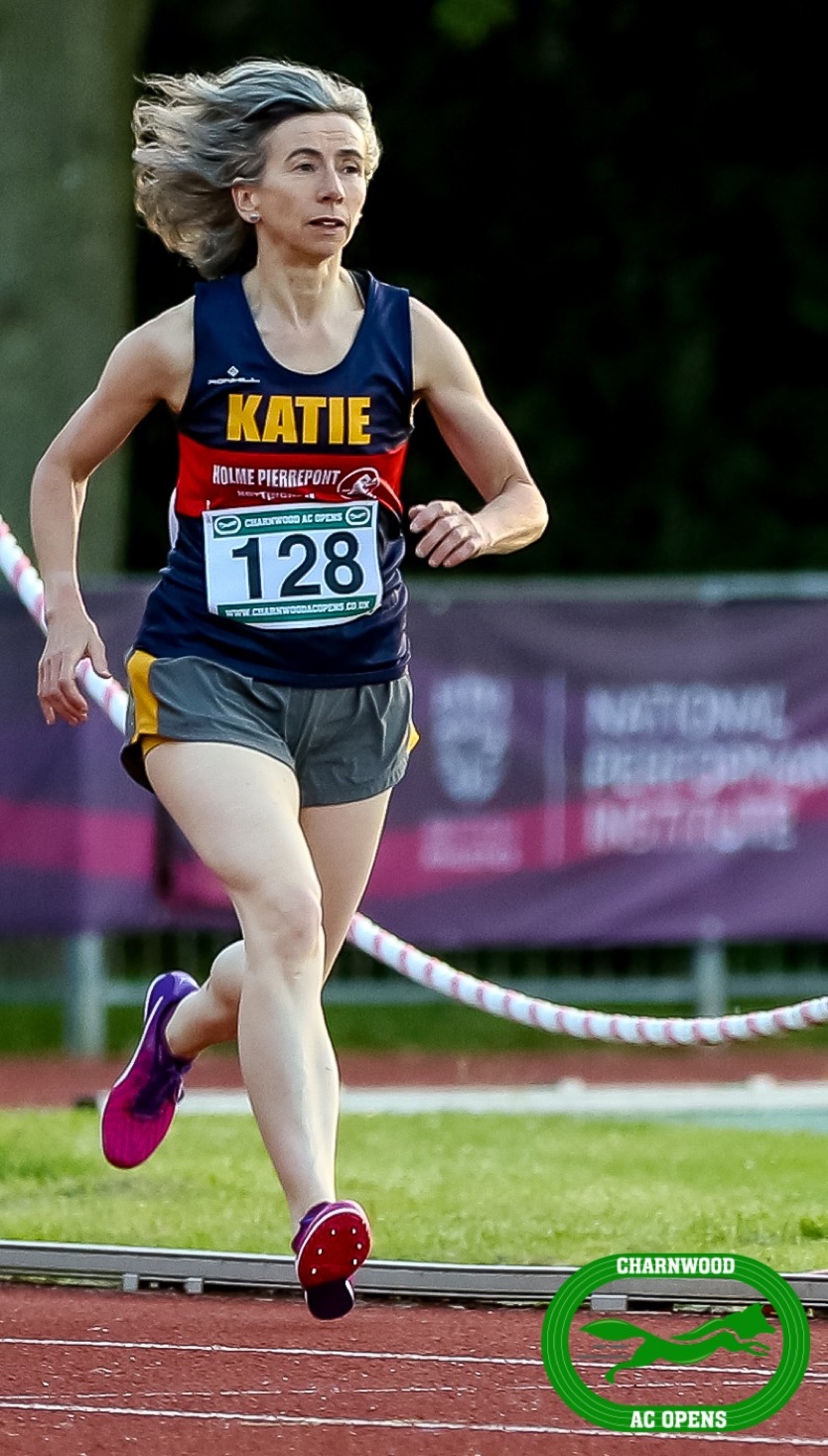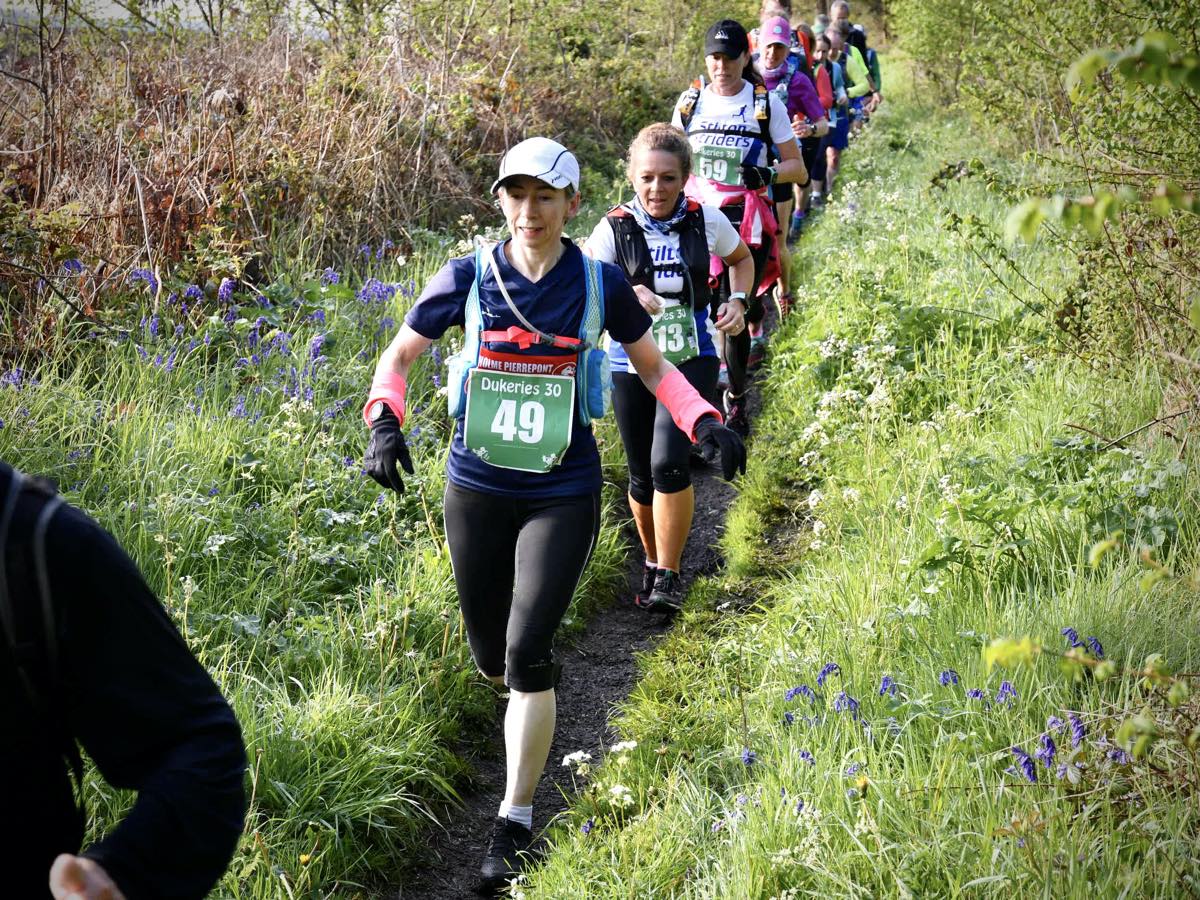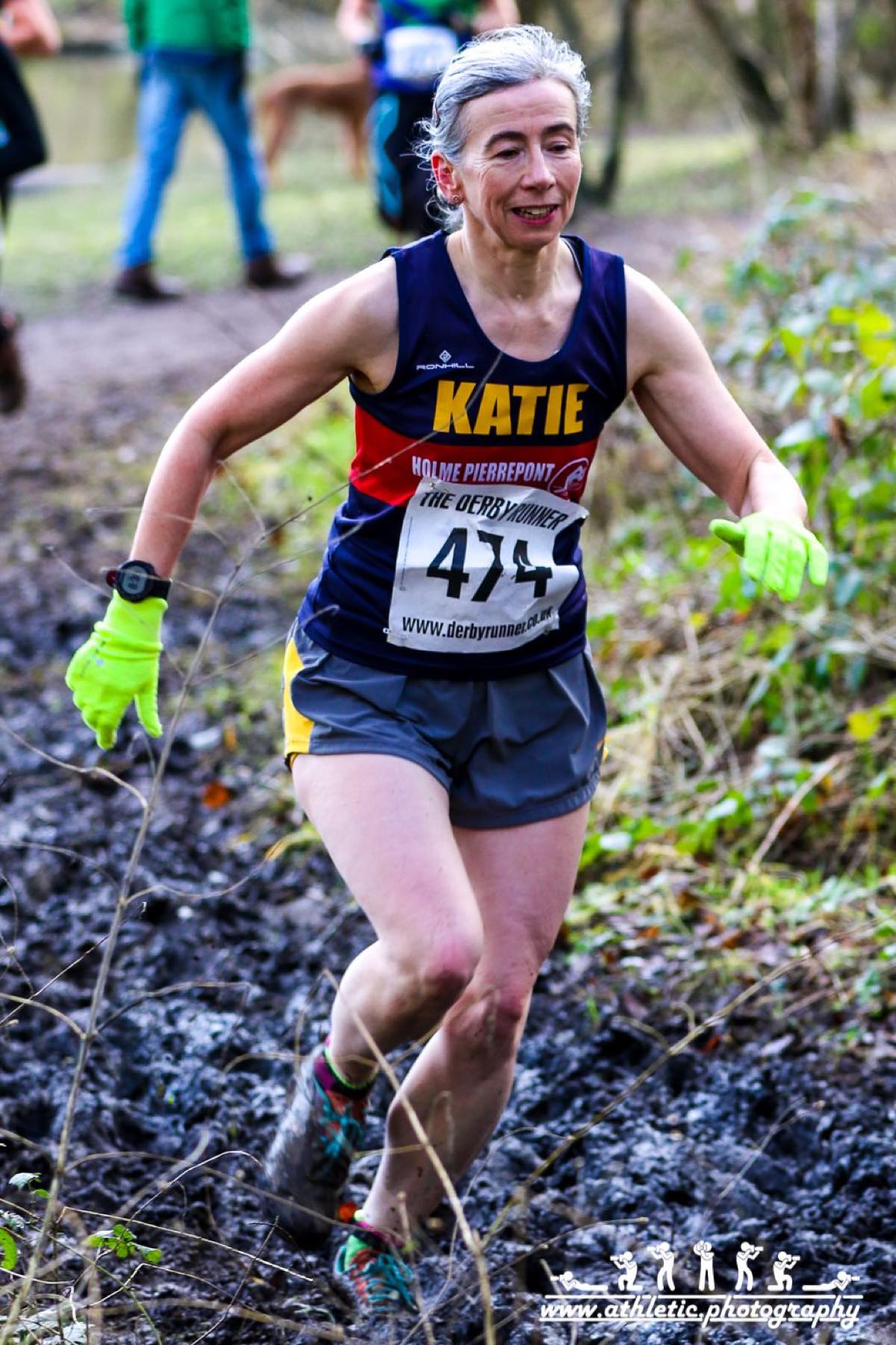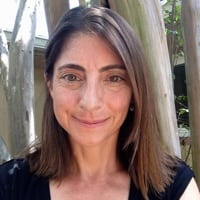“Age-Old Runners” is an article series where we explore runners’ performance potential after the age of 45 by interviewing excellent middle-aged runners. Is there still potential to improve? What roles do motivation, mindset, and specific training and recovery techniques play in allowing runners in their mid-forties to mid-sixties to continue to excel? To learn more about this series’ goals, check out its introductory article.
Katie Holmes started running in 2011 when she was 47 years old to help raise funds for a charity. She ran a five-mile leg of the Robin Hood Marathon Relay. Ten years on, she’s raced on the track, on roads, and cross country. Her races range from 200 meters in length to ultramarathons, and at 57 years old, she still feels she has a lot of potential to realize as a runner.
Shortly after Katie turned 50, she started the website RunYoung50 to “share and give value to the stories of older female runners.” This incredible resource includes the narrative of Katie’s running, articles and interviews highlighting the history of women’s endurance running, a list of blogs written by female runners who are over age 50, and more. Go check it out!
The following is a transcript of a Zoom interview with Katie. It has been lightly edited for brevity and clarity.
After training up and running your leg of that first marathon, did you consider your age as you set goals for yourself? Did being 47 limit your running aspirations?
It’s 10 years this month since I started running, so it’s great to be talking to you. I haven’t ever thought of it in terms of limiting myself because of my age. I think I can get faster because 10 years is still a relatively short time to be running. In 2019, I ran a 10-kilometer personal best by about eight seconds. I was pleased.… It was good to know I could still do that. Also, you can always reinvent yourself as a runner. I’ve only really started doing track races in the last five years.
It’s different when you start running later in life. You’re not looking back at some amazing time that you did when you were in your twenties. Every time I turn up at a track race, there’s still the potential for a personal best. In 2018, I ran a mile in less than seven minutes, which was a huge thing. I’d worked really hard at it all summer, and I’d just about given up on it. It was the fifth one-mile race that I’d run that year… I was last in the race. Usually, when I go to track races, I’m last. But, for me, it was a huge achievement. I still think that I can get faster. I think it’s partly about training, partly about mindset, and partly about how long you’ve been running.
After your fourth failed attempt to improve your mile time, did you wonder if you were too old to get faster? Were thoughts about your age a burden?
I don’t know if I thought of it specifically in terms of my age. We can’t deny that aging affects our performance, and sometimes we might have to reassess our goals…. I haven’t run on the track for a year and a half or more now because of the COVID-19 pandemic, and it may be that when I go back, I’ll start thinking that I can’t get faster [anymore]. I don’t know, but part of [achieving that goal] is being open to the idea. But, as I was saying about reinvention, it might be that you move onto something else like ultrarunning, or focusing on a different kind of racing. Or it might be that you set yourself different goals.
You’ve written about the cultural pressure that circumscribes older athletes’ goals. Please tell me more about that.
Cultural expectation is definitely an issue for older runners. After I did the Equinox 24-Hour Race, I got people who had taken part to answer some questions. One thing that came across quite strongly was that some people had families saying: “You shouldn’t be doing this. You’re too old. You’ll have a heart attack.” There’s that general feeling in society that as you get older, you should be doing less, protecting yourself, and resting.
How did your running progress after taking part in that first marathon?
That was in 2011, and I’d been running for six or seven months. What really made the difference was starting to do parkruns in January of 2012. Parkruns are a free 5k every Saturday morning. You can run or walk, it doesn’t matter. After I’d been going for a few weeks where some people ran past me, and they were breathing quite heavily, I thought, They’re putting a lot of effort into this, I wonder if I could run any faster. I tried following them, and found that I could run much faster. That was a milestone in terms of realizing that I could run faster.
Then, I started getting more involved in my running club, and going to events…. We do cross country in the winter and road races in the summer. We’re in these leagues. It was quite a change to my identity because you go from seeing yourself as somebody who runs, to seeing yourself as a runner, and then actually seeing yourself as an athlete. You think of yourself as someone who competes.
I’ve been doing cross country since 2012. I did road races with the club and, then, other road races as well. I decided to do 12 half marathons in 12 months…. That was a good experience, although I did get slower as I went on. Following that, I decided to do a marathon, but I’d had an injury, so I hadn’t really trained…. I’d heard about the Jeff Galloway method, so I decided to do it run-walking. I found it really easy to get into the rhythm. That was the 2016 Yorkshire Marathon. Then I got a club place in the London Marathon. To be honest, I wasn’t much faster. I hadn’t got my training right. I’ve actually put the marathon on the back burner because I only want to do one if I can run it quite a lot faster, which I think I could probably do if I trained, but I’m not sure it’s something I want to do.
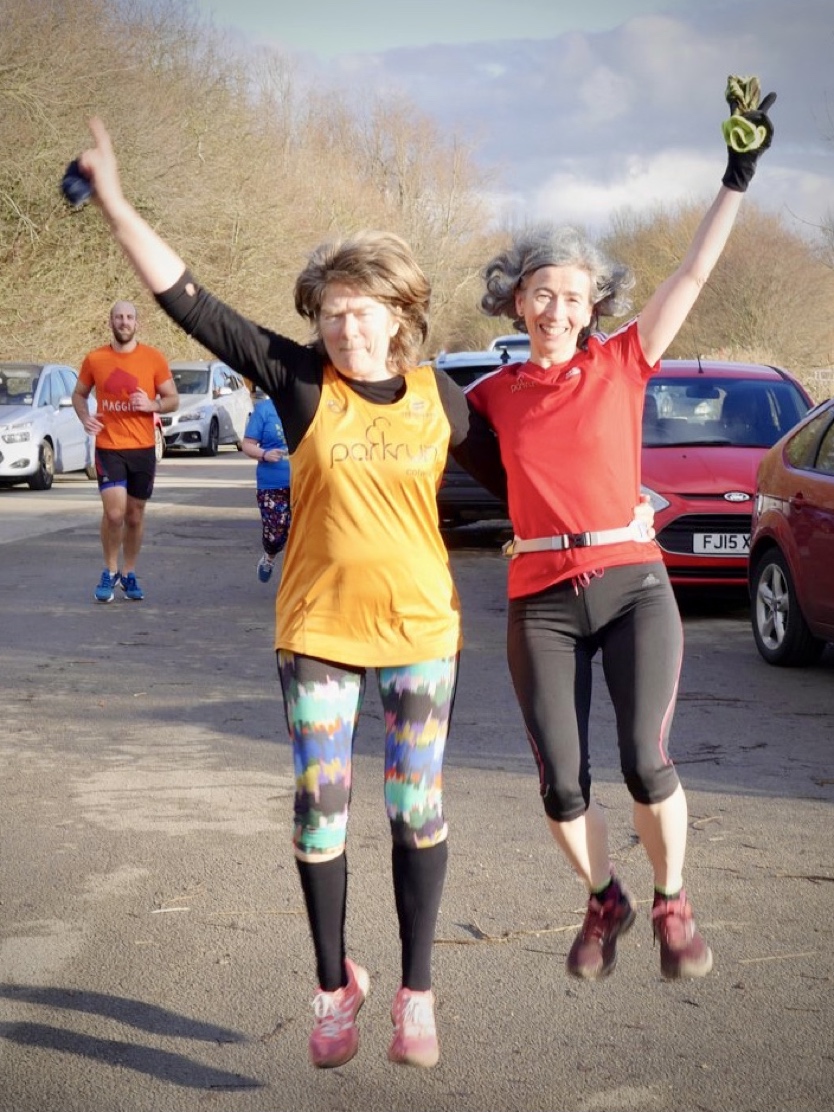
Katie (right) with friend Madeleine Wells at a New Year’s Day parkrun in 2019. Photo courtesy of Katie Holmes.
What are the cross-country races like?
They’re short. The longest one I’ve done is five miles…. Cross-country races are usually pretty muddy, and there’s quite a bit of up and down, and you might wade through water. I love them. There’s one race that has a short muddy bank down and up again, and as you’re approaching it, you can hear shrieking and clapping when someone falls in.
I read that your first track race was a mistake. You didn’t know the race was being held on a track, but, ultimately, you liked it. What do you like about track races?
It’s just something completely different. I never ran on a track at school. I never ran cross country at school either. At my club, we have track training sessions and club track championships. That’s been quite nice. You’re with people you know, and it’s not as scary as turning up at an open event where you don’t know anyone.
Tell me about your first open track meet.
That was at Charnwood Athletics Club…. I turned up and it was mostly children. There are lots of heats, and I was in the slowest heat for the 1,500 meters…. I lined up, and I was 55 years old, and I think the next competitor in age was maybe 15 or 16 years old. There might have been 10- or 11-year-olds in the heat too. They have a start gun, which you’re not used to. And they fired the start gun, and I just had this sensation that I was in slow motion. They’d all just run off. They were really primed to go. There was a young girl in front of me, she was maybe 11 or 12, and I remember thinking, Maybe I’ll be able to keep up with her. But she was more than half a lap ahead of me when she finished. Obviously, it’s a bit lonely when everyone else has crossed the line and you’ve still got half a lap to go. It’s quite hard psychologically.
Afterward, I wrote an article about it, and a guy commented that he was there with his daughter and he I thought was a really experienced track athlete. “I just assumed you were an experienced track athlete. You’ve inspired me to have a go.”It’s really good to show that it’s possible. I think I was the oldest person taking part that day, and, if I go to open meets, I’m often the oldest person there.
Most runners would be too self-conscious to put themselves in such an uncomfortable racing situation. What helps you to overcome that discomfort and try out different kinds of competitions?
I like a challenge. I remember feeling a bit sick about it when I got there, but then I thought: It’s less than 10 minutes of your life. Just go and do it, and it’ll be over, and you can have a cup of tea. A lot of people feel like that at the start of any race, don’t they? I like that feeling of really pushing myself to be the best that I can be.
Besides the Equinox 24-Hour Race, which you’ve done twice, have you done other ultras?
I’ve done one called the Dukeries 30 Mile. It’s a really lovely route in Sherwood Forest. That was in May of 2019, and I really enjoyed training for that.
What are your running goals now?
My running goal for last year was to get 80% age grading in a track race. [British Athletics has a website called the Power of 10 and it gives your age-graded percentage.] I’ve got to 78%, I think. So I might try that. I don’t think it’ll be this season, but maybe in 2022. I had this lockdown dream to do a 12-hour track race, the Crawley A.I.M. Charity 12-Hour Race. It’s supposed to take place in April. I’m training for that, and I’m going to do it virtually if it’s canceled.
When you reach the point when you’re not getting faster, will you still want to race?
I think I will because I just really love racing. It’s allowed me to experience that competitive side of myself that I’ve not really been able to express in any other way because I’ve not played team sports. I really like that you’re competing against yourself and others. And I think there are always things you can aim for. There are always things I haven’t done. If I do the 100 meters when I’m 60, it will be my best time because I haven’t done it before.
Why do you think older athletes stop racing?
For those who’ve had an amazing running career when they were younger, maybe they don’t feel the same motivation to race. They might not want to do the training in the same way either. I think a lot of runners find other things that motivate them.
I’m used to being with people who still race though. In my club, we’ve got quite a few runners in their seventies who are still racing and have goals. We have female runners in their seventies who are racing, which I think is great because if you’re a female runner in your seventies now, there were no role models when you were growing up.
Do you think more recognition of older athletes’ performances would have an impact?
That’s really important. There are a number of ways you can recognize the performances. For example, parkrun does age grading. They tell you in your results what your age grading is, and you can see who has the highest age grading that week. I edited our running-club newsletter for a while, and I started putting in people’s age gradings. It’s really important to celebrate the achievements of older runners. In our club, we have several runners who had the highest age grading at different parkruns.
Another thing is prizes. Race organizers often won’t give prizes in older categories. Their argument, particularly with women is: “There aren’t enough of them turning up.” But if the prize isn’t there…. If you are giving an [age-group] men’s prize, then you should be giving a women’s prize.
What have you learned from the interviews you’ve done with older female athletes that you’ve incorporated into your training and racing?
There are lots of things. One is the importance of being part of the running community. That’s been key for all of the women I’ve interviewed. They would never have done it just for the racing or fitness. Once you get to feel that you’re part of something bigger than you, it’s really powerful. I think that’s always going to be important to me.
Sandy Poole was the first woman that I interviewed. She was 70 when I interviewed her, and she said, “Your fifties is your best time. You should really enjoy running in your fifties.” She also said to just try things. She encouraged me to do track.
Describe your speedwork.
I’m doing interval sessions on Tuesdays. It’s our club’s virtual session.
Has your need for recovery changed over these past 10 years from age 47 to 57?
Recovery is really important for older runners. It’s not about slavishly following a plan. You’ve got to make sure you’re getting sleep and recovery.
I’m not sleeping as well, which I think is partly related to menopause. It really depends on how good my sleep’s been as to what I’m able to do. And I don’t think there’s any point in fighting that. You just have to go with where you’re at.
What do you do to prevent injury?
I do Iyengar yoga, which is good for strength and flexibility. I was doing a two-hour class once a week, but I’m not doing it [during the pandemic] because I found it a bit difficult to do online.
I am currently doing a class with Ros Shuttleworth, a chartered physiotherapist and athletics coach. It’s a 45-minute session delivered live online. It is aimed at adults of all ages and levels of fitness and focuses on functional fitness, joint mobility, and natural movement. It’s all about encouraging us to develop the range of movement we need to remain active and independent and to do the things we want to do. And about incorporating lots of different movement into our daily lives. Ros is really good at explaining how everything is connected. For example, how activating the feet before you run can help your balance.
I also use weights maybe 10 minutes every other day. And I do mobilization stuff before I go out for a run.
Training specifics:
- Weekly running volume: Up to 30 miles per week
- Strength training: Ten minutes every other day
- Off-season: No
- Sleep: Seven hours nightly
- Race nutrition: Real food like oatcakes with peanut butter, crisps, sandwiches
- Recovery: Three days a week off and as necessary
Three factors Katie attributes her running performance to:
- Having a reason to run
- Being willing to try new things
- The running community
Call for Comments
Calling all Katie Holmes stories! Use the comments section to leave yours.
Call for Photos
In our interview with Nancy Hobbs, she told us about a 60-year-old friend who hears, “You don’t look 60,” whenever he works out at the gym. He always responds, “I do look 60. I am 60.” A lot of you loved that response, so we want to highlight what our running ages look like in next month’s “Age-Old Runners” article. If you are over the age of 45, please email a photo of yourself out and about in your running gear to lizahoward401 at gmail dot com by March 21. Make sure the photo is high resolution and one that you own, and include your name and age. Thanks!
